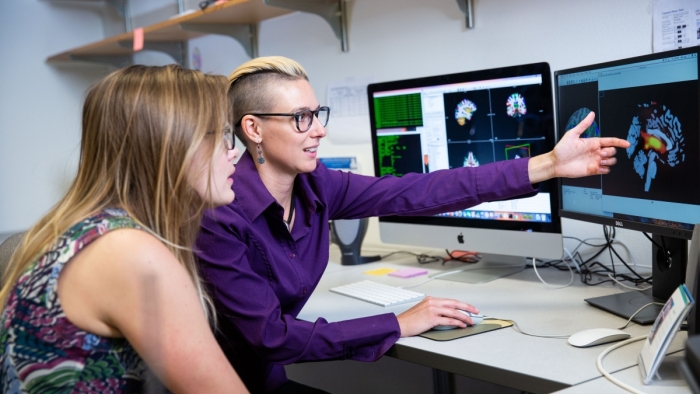The CDC estimates that more than 5 million adults in the United States have autism spectrum disorder (ASD), yet the condition and its effects on human cognition are still not fully understood.
“Autism as a diagnosis hasn't existed that long, and everyone thinks of autism as a childhood condition,” says B. Blair Braden, director of the Autism and Brain Aging Laboratory at Arizona State University.
Braden, an associate professor at ASU’s College of Health Solutions, has been researching autism and how it relates to memory challenges in adults since 2016. Thanks to a new grant from the National Institutes of Health (NIH), she will be able to expand upon an ongoing study that seeks to identify biomarkers and intervention targets in aging autistic adults.
According to the NIH, the research “will advance fundamental knowledge of brain aging vulnerabilities and mechanisms in ASD.”
The grant totals $3.3 million, with funds going toward staff salaries, equipment, participant compensation and hypothesis testing. The new funding will also allow the study to expand its reach into underrepresented communities where autism continues to be undiagnosed in many adults.
Because of the hereditary nature of autism, Braden’s team often evaluates parents and grandparents of autistic children who suspect they are also on the spectrum.
“A lot of people that come to our study, they have been undiagnosed their whole life,” Braden said. “Their child or grandchild is diagnosed with autism, and through that process, they learn more about autism. They realize that they are probably autistic, and then we're able to evaluate them.”
Braden’s study is conducted through participant questionnaires, cognitive tasks and neuroimaging tasks using an MRI.
This latest source of funding buoys her hopes for what the study may be able to accomplish by allowing her to work directly with more people.
“It's the best part,” Braden said, “… to have that more immediate impact in making people's lives better.”
The Autism and Brain Aging Lab is currently looking for adults 18 years and older with or without autism to participate in the study. Call 480-727-3970, email abalab@asu.edu or visit the lab’s website for more information.
Story by Aidan Hansen, communications assistant, College of Health Solutions
More Health and medicine

ASU, Mayo Clinic forge new health innovation program
Arizona State University is on a mission to drive innovations that will help people lead healthier lives and empower health care professionals to develop novel new health solutions. As part of that…

Innovative, fast-moving ventures emerge from Mayo Clinic and ASU summer residency program
By Georgann YaraIn a batting cage transformed into a custom pitching lab, tricked out with the latest in sports technology, Charles Leddon and his Mayo Clinic research teammates scrutinize the…
Is ‘U-shaped happiness’ universal?
A theory that’s been around for more than a decade describes a person’s subjective well-being — or “happiness” — as having a U-shape throughout the course of one’s life. If plotted on a graph, the…
